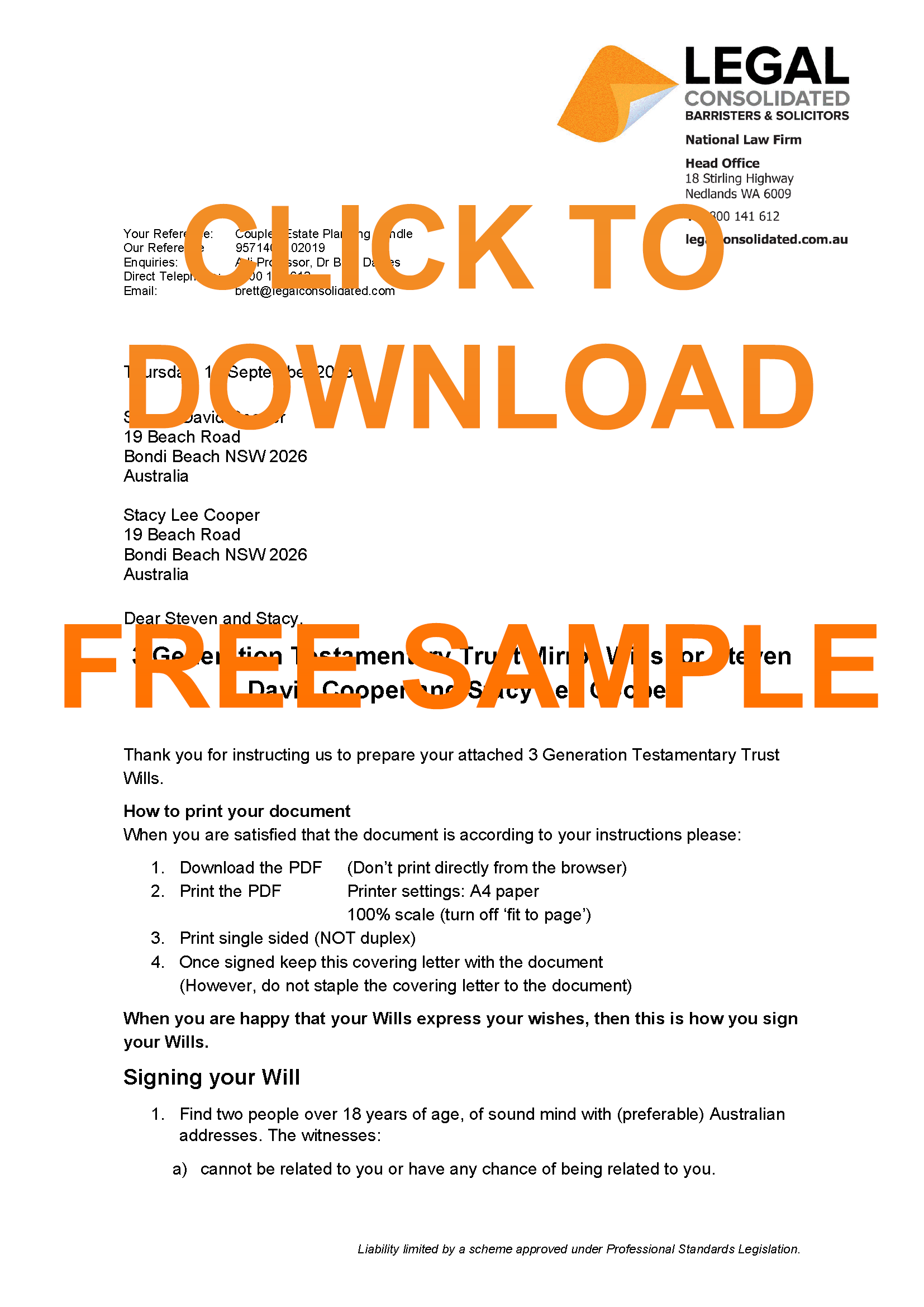
Company Constitution Replacement
$445 includes GST
-
Replace your old Memo & Articles of Association with a Constitution
Memorandum & Articles of Association
Australian companies created before 1 July 1998 had a ‘Memorandum & Articles of Association’ (Memo & Articles). Since then all newly incorporated companies should have a Constitution. Both Memo & Articles and Constitutions guide directors on how the company conducts itself.
Four Common Faults in Memorandum & Articles of Association
Your old Memorandum & Articles of Association may still operate. But not well. Faults with the old Memo & Articles: 
1. Memos & Articles require an AGM each year
Requiring an Annual General Meeting (AGM). However, the law no longer requires an AGM for Pty Ltd companies. No one has AGMs anymore. But if you don’t then your company is non-compliant. This is for both taxation and insolvency laws. Your new Constitution ensures that you do not have to have AGMs anymore.
2. Memos & Articles require a ‘purpose’
The Memo & Articles contain a ‘list of objects’. This is the purpose of the company. E.g. ‘sell fishing tackle and retail’.
What if your company now does something else, such as acting as a trustee of a doctor’s surgery? Then you break the law. Your company is acting ‘ultra vires’. It is acting outside its powers. Again, your company is non-compliant. Legal Consolidated’s Constitution allows you to do anything a human can do – and more
Your company is no longer restricted in what it can and can not do.
3. Memos & Articles require two directors. Two directors go bankrupt, instead of one
Memos & Articles require two directors. As stated above, the laws changed. You now only need one director. It is safer to only have one director in case the company goes insolvent
Good asset protection requires one director – not two.
4. Old Memo & Articles require you to perform out-of-date and illegal actions
Old Memo & Articles require strange and sometimes illegal behaviour. Instead, update the company constitution to allow these correct powers:
- exercise corporate powers
- issue and allot shares
- not avoid liability (a very strange requirement)
- transfer shares
- vote and proxies
- appoint directors and company secretary
- conduct general and director meetings
- sign bank documents, loans and mortgages (however, this may be useful because banks
 often cannot enforce a loan made by a company that is still working under old Memorandum & Articles of Association)
often cannot enforce a loan made by a company that is still working under old Memorandum & Articles of Association)
Be safe. Update to a Legal Consolidated Barristers & Solicitors’ Constitution
Replace Memos & Articles of Association on our law firm’s website
You are about to replace your old Memo & Articles with a Company Constitution on our law firm’s website. You are building everything you need including:
- Law firm covering letter
- Member Minutes
- New Constitution
See a full sample of the cover letter, minutes and new Constitution above.
ASIC requires nothing when you get rid of your old Memorandum & Articles of Association.
Do not send a copy of the new Constitution to ASIC. There are also no ASIC fees. This is when you replace your old Memorandum and Articles with a Legal Consolidated Constitution.
Every Member signs the Member Minutes
As we have drafted the update, each shareholder signs to give their consent. If you can’t get every shareholder to sign please telephone us. If the shareholder is dead their executor signs the Minutes, instead.
What is a Company Constitution?
The Constitution is a contract between the company, directors and shareholders (members). It is not mandatory to create a Constitution. Your internal procedures are, instead, governed by government Replaceable Rules. However, no accountants, lawyers or financial advisers would advise your company to rely on these Replaceable Rules. This is because Replaceable Rules are not tailored to your specific needs. Relying on Replaceable Rules is dangerous.
Constitution vs Replaceable Rules
Your company must have a set of rules. The rules are either:
- A Constitution – which you are about to build; or failing that
- Replacement Rules – set out in the Corporations Act
We often review a company incorporated on a non-law firm’s website. To ‘save time’ the non-law firm website adopts Replacement Rules for:
- a sole director, sole member company; or
- a Self-Managed Super Fund corporate trustee (special purpose company)
However, both of these companies must have a Constitution. Further, the Replaceable Rules are the bare minimum. There are additional powers that a company should have – our Constitution contains these additional powers and benefits. Also, the Replaceable Rules change at the whim of the current government. While the changes may benefit ‘society’ they may not be in the best interests of the shareholders. In contrast, constitutions can be amended at any time by the Members, just as you are about to do.
The 8 improvements to your old Memorandum and Articles of Association
The Constitution you are building updates your company’s internal rules and procedures. Your old Memorandum and Articles of Association set out the internal rules. Now your new Constitution does that job. Your new Constitution fully complies with changes to the Corporations Act. The 8 improvements are:
1. No Technology in old Memo & Articles
Technology has changed how a board can communicate with itself, employees and shareholders. When you replace a Company Constitution it is updated to reflect how changes in technology affect your business operations. Traditionally board decisions are mailed out in physical form to shareholders. However, email is a faster form of communication that is used by many businesses to correspond with shareholders. Your updated constitution takes into consideration how instantaneous communication affects your shareholders. Further, your constitution outlines how technology can be used in meetings.
2. Dividends and old company constitution
In 2010, the Australian government amended section 254 of the Corporations Act. This section governs how dividends are paid.
Before 2010 the Corporations Act stated that dividends could only be paid from company profits. However, after 2010 a company is not allowed to declare a dividend unless:
- the company’s assets exceed its liabilities; and
- the payment is fair and reasonable; and
- the payment does not materially prejudice the company’s ability to pay its creditors.
Under an old constitution, you may not have been able to pay dividends legally. Insolvency specialists pursue this argument. They challenge all dividends that you have paid since 2010.
3. Email voting in Memo & Articles
Shareholders can cast a vote regarding a meeting. Do it either online or through personalised voting forms. Members do not need to attend the meeting and can appoint a proxy. Your new Constitution improves meeting efficiency.
4. Share buybacks not allowed in old Constitutions
Share buybacks allow companies to buy back their shares from the shareholders. In Australia, there are 5 types of share buybacks. They are equal access, on-market, employee share scheme, selective buy-back and minimum holding. Replace a Company Constitution and ensure the legality of the share buyback.
5. Preference shares in an updated Constitution
A company has the power to issue preference shares under Australian law. Your new Constitution ensures that the preference shares are clear.
6. Single Directors are not allowed 
The Law Simplification Act 1995 (Cth) reduced the number of directors necessary for a company from two to one. Before then, you needed a minimum of 2 directors. This would often be a wife and a husband. The change was to allow women to start their businesses.
You now get away with just one director for your company. Most companies only have a single director.
Having two directors was a disaster for asset protection. Instead of one, both directors go bankrupt along with the insolvent company. Owe money to the ATO for PAYG or superannuation? Then all the directors are liable automatically for such unpaid debts. Better only a single director. Only one person goes down if the company is insolvent.
Asset protection is having no assets in a risky person’s name. Instead, assets are in the safe person’s name. This is called the ‘man of straw and the woman of substance’.
The new Constitution you are building allows you to have a single director.
7. Director’s resignations don’t work if the company requires 2 directors
Companies have rules. The rules are set out either in the Articles of Association or the Constitution.
Since 1995 you can have single-director companies. Yet, there are:
- over 27,000 Memorandum & Articles of Association;
- there are 59,000 Constitutions in Australia
that still requires that the company have two directors.
We review brand-new company Constitutions incorporated on a non-law firm website. Many still require the company to have two directors!
What if your rules say two directors – but one of you wants to resign?
You may try and resign as a director. You may lodge the correct form with ASIC to resign as a director. ASIC may accept the form. But the resignation is void as against a company liquidator and a trustee in bankruptcy.
This can be rectified by updating your company rules.
Also, if a company does not have enough officers, it breaches the Corporations Act 2001. This company pays penalties and is prosecuted for not meeting its obligations:
8. Division 7A Loan Agreement
When you replace the Company Constitution you get a Division 7A Loan Agreement. This is part of the Constitution. It is built into the Constitution. It works for each Member and any new Member.
Business Structures for Personal Services Income, tax and asset protection
Family trust v Everett’s assignments
- Family Trust Deed – watch the free training course
- Family Trust Updates:
- Everything – Appointor, Trustee & Deed Update
- Deed ONLY – only update the Deed for tax
- Guardian and Appointor – only update the Guardian & Appointor
- Change the Trustee – change human Trustees and Company Trustees
- The company as Trustee of Family Trust – only for assets protection?
- Bucket Company for Family Trust – tax advantages of a corporate beneficiary
Unit trust vs Everett’s assignments
- Unit Trust
- Unit Trust Vesting Deed – wind up your Unit Trust
- Change Unit Trust Trustee – replace the trustee of your Unit Trust
- Company as Trustee of Unit Trust – how to build a company designed to be a trustee of a Unit Trust
Corporate structures and Everett’s assignments
- Partnership Agreement – but what about joint liability?
- Incorporate an Australian Company – best practice with the Constitution
- Upgrade the old Company Constitution – this is why
- Replace lost Company Constitution – about to get an ATO Audit?
- Independent Contractor Agreement – make sure the person is NOT an employee
- Service Trust Agreement – operate a second business to move income and wealth
- Law firm Service Trust Agreement – how a law firm runs the backend of its practice
- Medical Doctor Service Trust Agreement – complies with all State rules, including New South Wales
- Dentist Service Trust Agreement – how dentists move income to their family
- Engineering Service Trust Agreement – commonly engineers set up the wrong structure
- Accountants Service Trust Agreement – complies with ATO’s new view on the Phillips case

